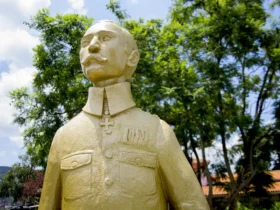1. Lead with Purpose
Nelson Mandela’s life was defined by his unwavering commitment to justice and equality. He once said, “What counts in life is not the mere fact that we have lived. It is what difference we have made to the lives of others that will determine the significance of the life we lead.” His leadership was deeply rooted in his purpose of ending apartheid and building a democratic South Africa.
Key Takeaway: Leaders should have a clear vision and purpose that transcends personal gain, focusing instead on making a meaningful impact.
2. Practice Resilience in Adversity
Nelson Mandela endured 27 years of imprisonment, yet he emerged with an unbroken spirit. Instead of harboring resentment, he used the time to strengthen his resolve and prepare for the challenges ahead.
Key Takeaway: Great leaders persevere through hardships, using adversity as a tool for growth and preparation.
3. Embrace Forgiveness
One of Mandela’s most remarkable qualities was his ability to forgive those who oppressed him and his people. Upon his release, he chose reconciliation over revenge, fostering unity in a divided nation.
Key Takeaway: Forgiveness is a powerful leadership tool that can heal wounds and build bridges. Leaders must prioritize unity over personal grievances.
4. Lead by Example
Mandela’s leadership was marked by his actions, not just his words. Whether it was donning traditional attire to honor his heritage or stepping down after one term as president, he consistently modeled the behavior he wanted to see in others.
Key Takeaway: Authentic leaders lead through their actions, inspiring others to follow by demonstrating integrity and commitment.
5. Communicate Effectively
Nelson Mandela was an exceptional communicator, known for his ability to articulate his vision with clarity and inspire hope. His speeches and writings galvanized millions around the world.
Key Takeaway: Effective communication is at the heart of great leadership. Leaders should strive to connect with their audience, share their vision, and inspire action.
6. Adaptability is Key
Throughout his life, Nelson Mandela demonstrated remarkable adaptability. Whether as a revolutionary leader, a prisoner, or a statesman, he adjusted his approach to suit the context without compromising his principles.
Key Takeaway: Leaders must be flexible and willing to adapt their strategies to achieve their goals in changing circumstances.
7. Empower Others
Nelson Mandela believed in empowering those around him. He recognized that building a better nation required collective effort and encouraged others to take responsibility for the change they wanted to see.
Key Takeaway: Empowering others fosters collaboration and multiplies the impact of leadership. Effective leaders build teams that share their vision.
8. Remain Humble
Despite his global stature, Nelson Mandela remained humble and approachable. He was known for his warmth, humility, and genuine interest in others, no matter their status.
Key Takeaway: Humility enhances a leader’s ability to connect with people and earn their respect and trust.
9. Commit to Lifelong Learning
Nelson Mandela’s time in prison was not wasted; he used it to read extensively and reflect deeply. This commitment to self-improvement was evident throughout his life.
Key Takeaway: Continuous learning and self-improvement are essential traits of effective leaders who strive to stay relevant and informed.
10. Lead with Compassion
Nelson Mandela’s leadership was deeply compassionate. He understood the struggles of his people and worked tirelessly to address their needs, always putting humanity first.
Key Takeaway: Compassionate leadership builds trust and fosters loyalty. Leaders who care for their people inspire greater dedication and effort.
Conclusion
Nelson Mandela’s leadership lessons are timeless and universally applicable. By embodying purpose, resilience, forgiveness, and compassion, he showed the world what it means to lead with integrity and vision. Whether you’re leading a team, an organization, or a movement, these lessons fromNelson Mandela’s life offer invaluable guidance on how to inspire and empower others while creating meaningful change.
Which of these lessons resonates most with your leadership journey? Share your thoughts in the comments below!
see also Gaddafi’s Vision for Africa: Pan-Africanism, Controversy, and Conflict






























